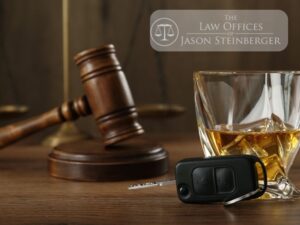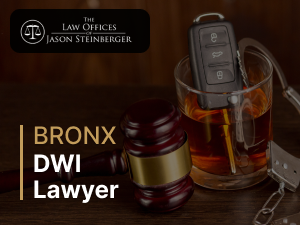Bronx DWI & DUI Lawyer
Experienced Bronx DWI & DUI Attorney Ready to Serve You
 If you’re facing charges for driving while intoxicated (DWI) or driving under the influence (DUI) in the Bronx, you need an experienced lawyer to defend you. We understand how overwhelming and stressful it can be to face these charges. Our skilled DWI attorney is dedicated to fighting for your rights and helping you achieve the best possible outcome for your case. We have a deep understanding of New York State DWI laws and the legal system, and we will work tirelessly to protect your rights and ensure that you receive a fair trial. Contact us today to schedule a free consultation and start building your defense.
If you’re facing charges for driving while intoxicated (DWI) or driving under the influence (DUI) in the Bronx, you need an experienced lawyer to defend you. We understand how overwhelming and stressful it can be to face these charges. Our skilled DWI attorney is dedicated to fighting for your rights and helping you achieve the best possible outcome for your case. We have a deep understanding of New York State DWI laws and the legal system, and we will work tirelessly to protect your rights and ensure that you receive a fair trial. Contact us today to schedule a free consultation and start building your defense.
What is the difference between DWI and DWAI?
- Intoxicated is defined as the voluntary consumption of alcohol causing impairment which renders a person incapable to a substantial extent of employing the physical and mental abilities which are needed to possess in order to operate a vehicle as a reasonable and prudent driver.
- Impairment is defined as an impairment to any extent of the physical and mental abilities needed to be possessed in order to operate a vehicle as a reasonable and prudent driver.
- DWI: Operating a Motor Vehicle While Intoxicated is a misdemeanor offense which means that if a person is convicted of this offense he/she would have a criminal record. First-time offenders face a maximum one-year jail term and/or a fine of $500-$1000 and a mandatory license revocation of six months. In the Bronx, any conviction for a DWI-related misdemeanor results in the installation of an Ignition Interlock Device. There is no enhancement of sanctions if the defendant has a prior conviction of DWAI. A prior conviction for DWI within the last 10 years will result in a felony charge and enhanced sanctions.
- DWAI: Operating a Motor Vehicle While Ability Impaired is a traffic infraction and not a crime. If convicted of this offense you will not have a criminal record. A first-time offender shall be punishable by a maximum jail term of 15 days and/or a fine of $300-$500 and a license suspension of 90 days. A second-time offender within 5 years shall be punishable by a maximum jail term of 30 days, and/or a fine of $500-$750, and a license suspension of 6 months. A third-time offender shall be punishable by a maximum jail term of 90 days, and/or a fine of $750-$1500, and a license suspension of 6 months. It’s important that you consult with an experienced Bronx DUI attorney immediately.
What are the different crimes involving alcohol and drug-related driving violations in NY?
- Aggravated DWI/Aggravated Driving While Intoxicated: .18 BAC or higher.
- DWI Driving While Intoxicated: .08 BAC* or higher or other evidence of intoxication.
- DWAI: Driving While Ability Impaired (by alcohol): .05 BAC* to .07 BAC*, or other evidence of impairment.
- DWAI/Drugs: Driving While Ability Impaired (by a drug that is not alcohol).
- Chemical Test Refusal: A driver who refuses to take a chemical test (normally a test of breath, blood, or urine) can receive a driver’s license revocation of at least one year (18 months for a commercial driver) and must pay a $500 civil penalty ($550 for a driver of commercial vehicles) to apply for a new driver license. A driver who refuses a chemical test during the five years after a DWI-related charge or previous refusal will have their driver’s license revoked for at least 18 months (permanent for a commercial driver) and must pay a $750 civil penalty to apply for a new driver’s license. If the driver is under age 21, and refuses a chemical test during the five years after a DWI-related charge or previous refusal, they will have their driver’s license revoked for at least one year or until age 21, whichever is longer, and must pay a $750 civil penalty to apply for a new driver license.
- Zero Tolerance Law: A driver who is less than 21 years of age and who drives with a .02 BAC to .07 BAC violates the Zero Tolerance Law.
Breathalyzer Refusal
New York is an implied consent state, meaning that while you are technically allowed to refuse a breathalyzer, doing so will result in the suspension of your license.
Bronx DWI Lawyer: DUI with Serious Injury or Death
 A driver who causes serious injury or death to another person while driving under the influence is often charged with a more serious crime than just DWI.
A driver who causes serious injury or death to another person while driving under the influence is often charged with a more serious crime than just DWI.
Vehicular Manslaughter
Vehicular manslaughter occurs when a driver who is under the influence of alcohol or drugs causes the death of another person. There are three categories of vehicular manslaughter: first-degree, second-degree, and aggravated. The category of vehicular manslaughter depends on the circumstances of the case.
Second Degree
Second-degree vehicular manslaughter is the lowest possible charge when a death occurs. To prove second-degree vehicular manslaughter, the prosecution must prove:
- The defendant was driving while intoxicated by drugs and/or alcohol in violation of New York’s DUI law; and
- As a result of their intoxication, the defendant caused the death of another person.
A second-degree vehicular manslaughter conviction carries a maximum punishment of seven years in prison and $5,000 in fines.
First Degree
A second-degree vehicular manslaughter charge is enhanced to a first-degree vehicular manslaughter charge, if in addition to causing the death of another while driving intoxicated, the driver:
- Had a BAC at or over .18%;
- Was driving with a suspended license that had been suspended for
- DWI or refusal to submit for DUI chemical testing;
- Has a prior DWI conviction within the last ten years;
- Has prior vehicular manslaughter or vehicular assault conviction;
- Caused more than a single death; or
- Had a passenger in his or her vehicle under the age of 15 whose life was taken.
A first-degree vehicular manslaughter conviction carries a maximum punishment of fifteen years in prison and $5,000 in fines.
Aggravated
To establish aggravated vehicular manslaughter, the prosecution must first show that all the elements are present for a first-degree manslaughter charge. Additionally, the prosecutor must prove that the driver was engaged in reckless driving at the time of the accident.
An aggravated vehicular manslaughter conviction carries a maximum punishment of twenty-five years in prison and $5,000 in fines.
Vehicular Assault
Vehicular assault is similar to vehicular manslaughter except in this situation, the party injured by the intoxicated motorist is only injured, rather than killed.
Second Degree
Second-degree vehicular assault occurs when a motorist causes “serious physical injury” to another while driving under the influence.
A second-degree vehicular assault conviction carries a maximum punishment of four years in prison, five years of probation, and fines up to $5,000.
First Degree
First-degree vehicular assault occurs when a motorist causes “serious physical injury” to another while driving under the influence. Additionally, one of the following factors must be present. The driver:
- Had a BAC at or over .18%;
- Was driving with a suspended license that had been suspended for DWI or refusal to submit for DUI chemical testing;
- Has a prior DWI conviction within the last ten years;
- Has a prior vehicular manslaughter or vehicular assault conviction;
- Caused more than a single serious physical injury; or
- Had a passenger in his or her vehicle under the age of 15 who was seriously injured.
A first-degree vehicular assault conviction carries a maximum punishment of seven years in prison, five years of probation, and fines up to $10,000.
What Will Happen If I Refuse to Take The Chemical Test?
- License Suspension: If you refuse a chemical test for BAC (Blood Alcohol Content), your license will be suspended at arraignment in court and may be subsequently revoked for at least one year at a Department of Motor Vehicles hearing. The result of the Department of Motor Vehicles hearing may have an effect on the license suspension, separate and apart from the suspension imposed by the Criminal Court after conviction. You will also be subject to a civil penalty of $750, to be paid over 3 years ($250 per year). The penalties and fines for refusing to submit to a chemical test are separate from, and in addition to the penalties and fines for alcohol or drug-related convictions.
- Effect of Refusal at trial: The District Attorney’s Office can use a person’s refusal to submit to the chemical test, Intoxilyzer 5000, at trial as evidence of consciousness of guilt.
Let a DWI & DUI firm handle your case. It is best to retain the services of a skilled Bronx DWI attorney as early as possible in the process.
Conditional License Eligibility
- Pre-Conviction Conditional License: If you are arrested for a DWI or DWAI and it is your first arrest you are eligible for a Pre-Conviction Conditional License. This will grant you conditional privileges to operate a motor vehicle in NY until a final suspension order is issued.
- Post Conviction Conditional License: If you receive your first conviction for DWI or DWAI and you participate in the Drinking Driver Program (DDP), you can receive a conditional license. The DMV determines if you are eligible for the DDP.
What’s A Hardship License?
Drivers who have their license suspended or revoked due to an alcohol- or drug-related offense can apply for a hardship license to keep their driving privileges in a limited manner. A hardship license hearing is required before the hardship license will be issued. To obtain a hardship license, you must show that you cannot obtain alternative transportation to and from work or school.
Your NY DUI & DWI Law Firm – Law of Offices of Jason A. Steinberger, LLC – Request a Free Consultation
 Our experienced DWI lawyer, Jason A Steinberger, is ready to evaluate your case to decide how we can fight for you!
Our experienced DWI lawyer, Jason A Steinberger, is ready to evaluate your case to decide how we can fight for you!
Don’t wait. Contact our skilled and aggressive Bronx DUI lawyer by calling the Law Offices of Jason A. Steinberger, LLC today.
Our firm also handles clients with other types of cases such as:
- Criminal Charges Defense,
- Theft Charges,
- Grand Larceny,
- Petit Larceny,
- Identity Theft,
- Gun Crime,
- Reckless Driving,
- Prostitution,
- Shoplifting,
- Weapons Possession,
- False Arrest,
- Criminal Mischief,
- Stalking,
- Gravity Knife Defense,
- Robbery,
- Homicide, and
- Sexual Crimes.
Request a free consultation with a proven Bronx DWI lawyer today.